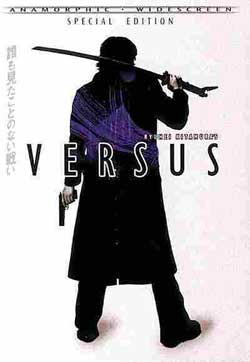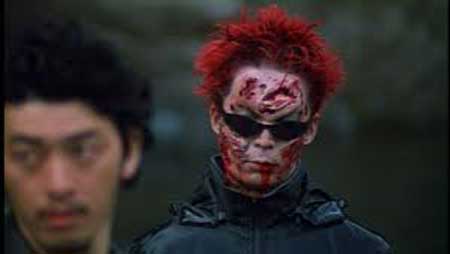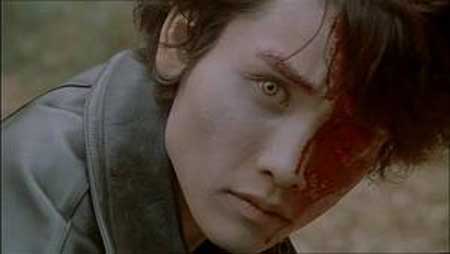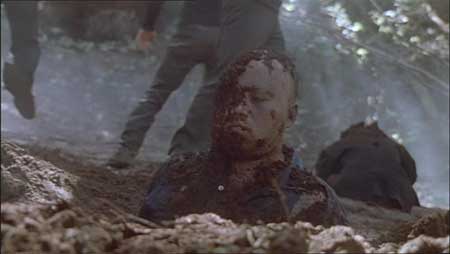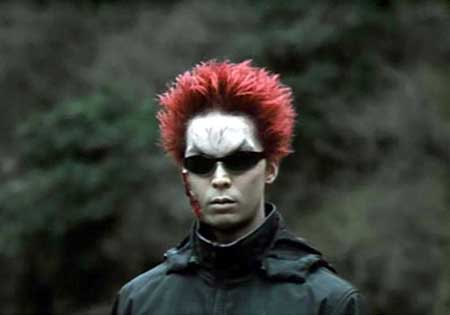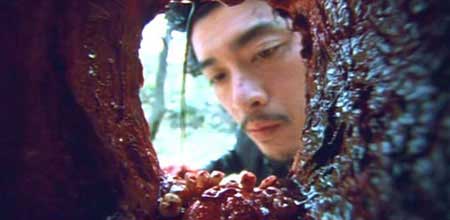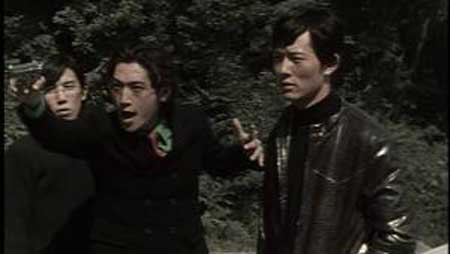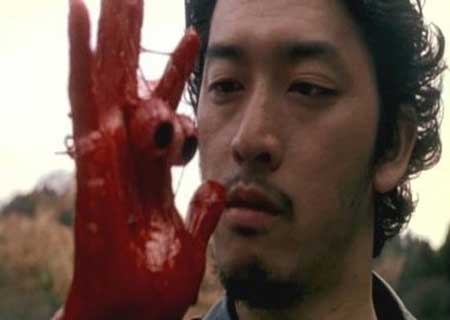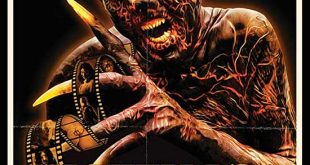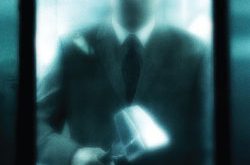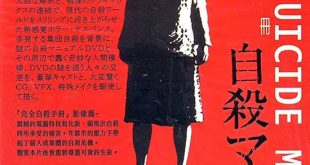SYNOPSIS:
There are 666 portals that connect this world to the other side. These are concealed from all human beings. Somewhere in Japan exists the 444th portal…. The forest of resurrection.
REVIEW:
We all like to whine and wring our hands about how there’s too much choice these days, entertainment-wise, and how a lot of the time you just can’t make your mind up what you want to watch. You don’t know whether you want to watch horror or comedy, martial arts or crime, so instead you end up channel-surfing and just seeing a lot of stuff you definitely don’t want to watch. Poor us, eh? Versus, however, relieves the viewer of the burden of any such choice, combining as it does all of the genres I just mentioned and a few more for good measure. The surprising thing is, it works.
I say surprising, because if I try to sum up the film in a sentence, it invites a wealth of lazy comparisons that make it sound like an absolute mess. I might say, for instance, that it’s like the bastard son of Highlander crossed with Big Trouble in Little China, only directed by Paul Verhoeven. It could equally be characterised as a genre film if one of its core elements were emphasised ahead of the others—a zombie film, yakuza film, a samurai film or a chop sockey film. While it’s all of these things, it’s more than the sum of its parts, which is why I think it’s become such an enduring cult film.
For one thing, it’s extraordinarily well-made considering the obviously limited budget. The camerawork is relentlessly flashy and stylish, as is the editing, and the result is very impressive. The chops are cribbed most obviously from Woo, Tarantino and Rodriguez, but there are little flashes of Scorsese and Peckinpah in there too. The fight choreography, too, is excellent throughout. The opening scene sets the tone with a lone samurai facing off against a zombie horde who are closing in on him from all sides. When he has despatched the last of them he comes face to face with a Shang Tsung-type evil sorcerer, who—to borrow the American terminology—promptly hands him his ass.
The film serves up a huge fight scene roughly every eight minutes, on average. It might have ended up being tedious if there wasn’t such a strong emphasis on fun. Versus is very cartoonish—or rather very comic book—and there is a strong strain of slapstick and silly humour that calls to mind the Evil Dead trilogy. There are a couple of bungling cops, one of whom is prone to making absurdly grand, hyperbolic statements about himself with a straight face, and these two are responsible for some of the funniest moments in the film. They are outshone, however, by the most outlandish ensemble of bad guys this side of RoboCop. The foremost of these is Kenji Matsuda, whose role is listed as ‘Yakuza Leader with butterfly knife’. He turns in a wickedly funny and over-the-top performance, part Christopher Walken and part Vincent Cassel, and he only gets better as the film goes on.
The film is not without its flaws, of course. For one thing, it’s far too long. There is never a lull in the proceedings, but two full hours of constant high octane action is a lot to take in. It’s not that Versus requires a lot of concentration to watch—it absolutely doesn’t—but I imagine it would play best in a room full of people too stoned to move. The English dub is atrocious, as these things tend to be, and as usual no effort was made to find voices that even faintly matched the faces. The protagonist, for instance, is a clean-cut, fresh-faced bishonen type whose dialogue is dubbed with a raspy baritone worthy of Kevin Conroy.
Overlooking that (or even taking it as part of the charm), this was a pleasure to watch. Versus succeeds in all its major aims through sheer joy in its own audacity and silliness. If you want to see your hero instantly level-up after salvaging a black leather trenchcoat from a corpse, this film is for you. If you want to see corpses come back to life and then gun down their own murderers, look no further. For good old fashioned moronic entertainment, you could do an awful lot worse.
Versus (2000)
 Horror News | HNN Official Site | Horror Movies,Trailers, Reviews
Horror News | HNN Official Site | Horror Movies,Trailers, Reviews
